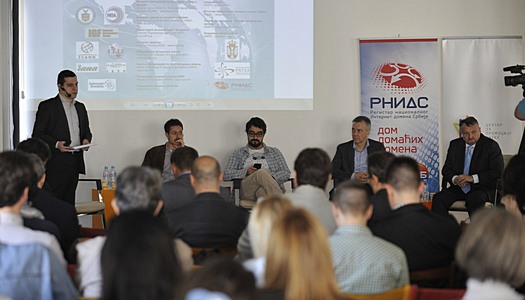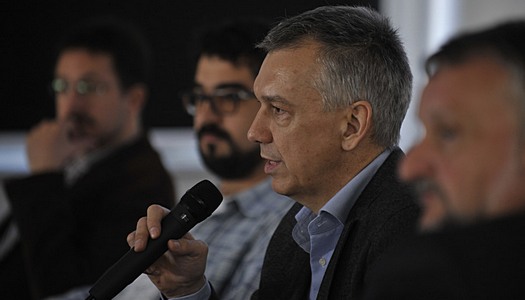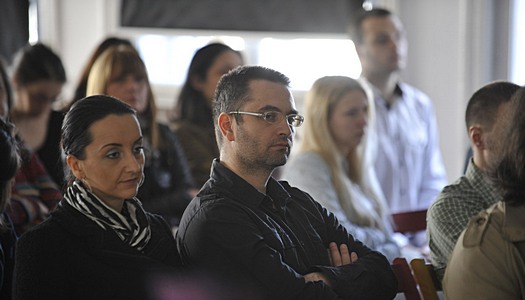
On 10th April, the Serbian National Internet Domain Registry (RNIDS), together with the Centre for the Promotion of Science, organized a panel debate themed, “Lords of the Internet - a Change in Governance”.
The event was occasioned by the decision by the US Commerce Department in March of this year to initiate a key phase in globalising the Internet governance, whereby it would cease to be controlled by the US. To mark this, ICANN (the Internet Corporation for Assigned Names and Numbers) has launched a global consultation process on what form the new “multistakeholder” system of Internet governance should take. The aim of the debate, held at the Centre for the Promotion of Science, was to inform the public and to spur the Serbian Internet community into getting involved in this global process of consultations. Issues of privacy, recent global affairs and possible directions for the future development of the Internet were some of the questions that especially interested participants.
Who governs and who supervises?
‘The “multistakeholder” model is the most complicated system of stewardship ever devised by man,’ said Danko Jevtović, director of RNIDS. So why is the USA insisting on just this model as the basis for the new approach to managing the global network? The reason is that it involves broad participation by all stakeholders, from Internet providers, states and large organisations, all the way to the end users of the Internet. Under this system, all stakeholders would play an equal part in supervising the way in which ICANN performs the so-called IANA functions.

The Internet Assigned Numbers Authority or IANA is a part of ICANN in which a small number of staff maintains a unified table of top-level domains (such as .RS or .UK for example). ‘In practice this means that a state could request the deletion of the top-level Internet domain of another state, and ICANN could approve it. That is why its work must be monitored,’ explained Jevtović. However, not all the global players are happy at the fact that this critical function of Internet stewardship is under the direct supervision of the USA (specifically the Commerce Department), with which ICANN has an agreement until September 2015. Never in the history of the Internet has a country’s top-level Internet domain been deleted, not even during fierce political conflict or diplomatic disputes, but pressure and demands for change continue to grow.
‘The Snowden affair accelerated change in the Internet governance, although the USA would never admit that,’ said Vladimir Radunović, coordinator of educational and training programs in e-diplomacy at the DiploFoundation. After this affair emerged, and data was revealed regarding global eavesdropping, Argentina and Brazil began to raise questions regarding control of the Internet with the Security Council of the United Nations. ‘In order to allay the fears of Brazil as one of the leading economies and a country with a clear digital strategy, ICANN initiated the Net Mundial organisation,’ explained Radunović, adding that all the global players will meet in São Paulo in late April to discuss the future of the Internet governance.
The role of Serbia in the global processes
Milan Janković, director of RATEL, the Serbian Agency for Electronic Communications, believes that the debate on the future of the Internet governance is important, but that human rights and broadband access to the Internet must be key issues in this process. ‘It is the public that uses the Internet on a daily basis and they should be given the broadest possible access,’ Janković added. Internet privacy, respect for data protection laws and control over content were subjects that particularly interested visitors, who were also keen to find out how Serbia could get involved in the global debate on Internet governance.

Serbia has representatives in organisations such as ICANN, the Council of Europe, the International Telecommunication Union (ITU), the Internet Society (ISOC) and the Internet Governance Forum (IGF), and can play an active part in contributing to the consultation process regarding how the new Internet governance model will look in the future. ‘Serbia needs to decide on its local and global stance on the issue of Internet stewardship – the more we get involved the more the players in this process will listen to us,’ said Marko Đorđević, programmer and activist of the Serbian branch of ISOC.
RNIDS is actively involved in the work of ICANN and will continue to inform the public on developments. ‘Similarly to IANA, RNIDS manages the table of top-level Internet domains, but at the local level. As the register for the national .RS and .СРБ Internet domains, we are considered a global stakeholder that can be brought on board in the process of planning the future of Internet governance,’ concluded Danko Jevtović, RNIDS director, calling on the local Internet community to get involved in the global consultation process.
Guide to terms:
The Internet Corporation for Assigned Names and Numbers (ICANN) is the organisation responsible for managing the global structure of the Internet, which is comprised of IP addresses, domain names (gTLDs and ccTLDs) and root DNS servers. For more information see: www.icann.org
The Internet Assigned Numbers Authority (IANA) operates under the auspices of ICANN and is responsible for coordinating key elements of the Internet’s operation: the DNS Root Zone, IP addresses, AS numbers and Internet protocol registries. For more information see: www.iana.org
The Serbian National Register of Internet Domain Names (RNIDS) is a professional, non-governmental, not-for-profit foundation established to manage the .RS and .СРБ country code top level Internet domains in a way that serves the general interests of all Serbian citizens. For more information see: www.rnids.rs